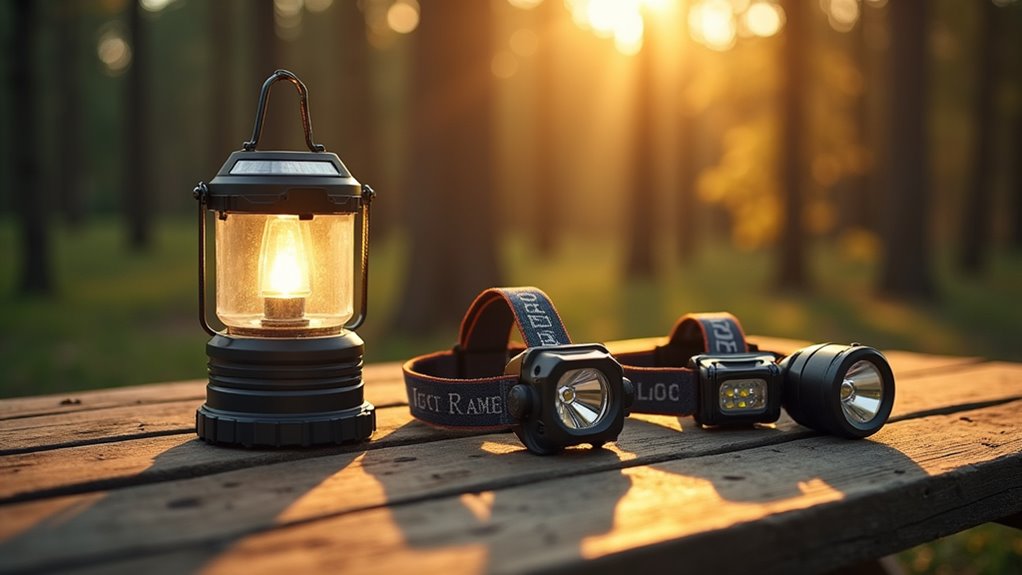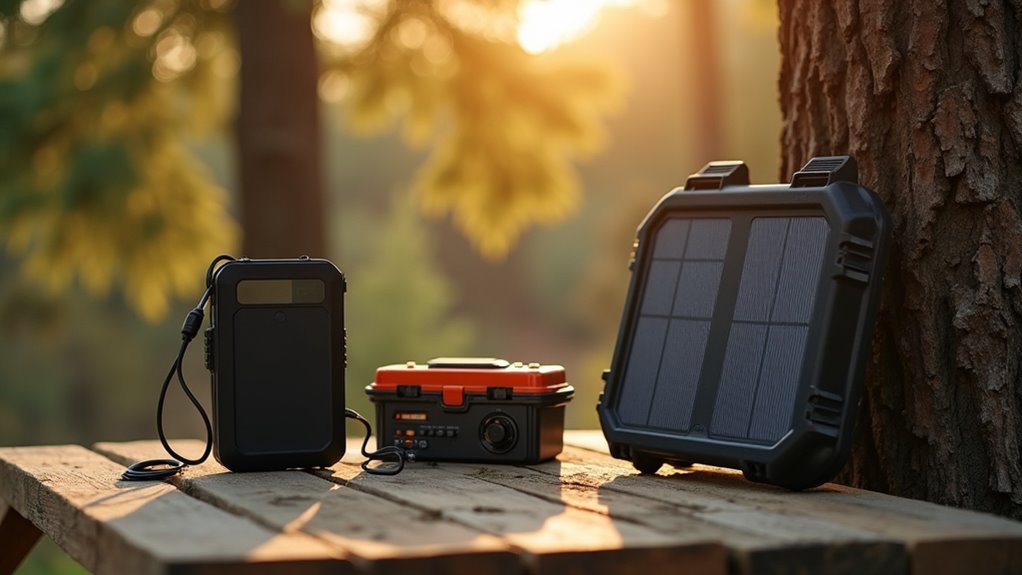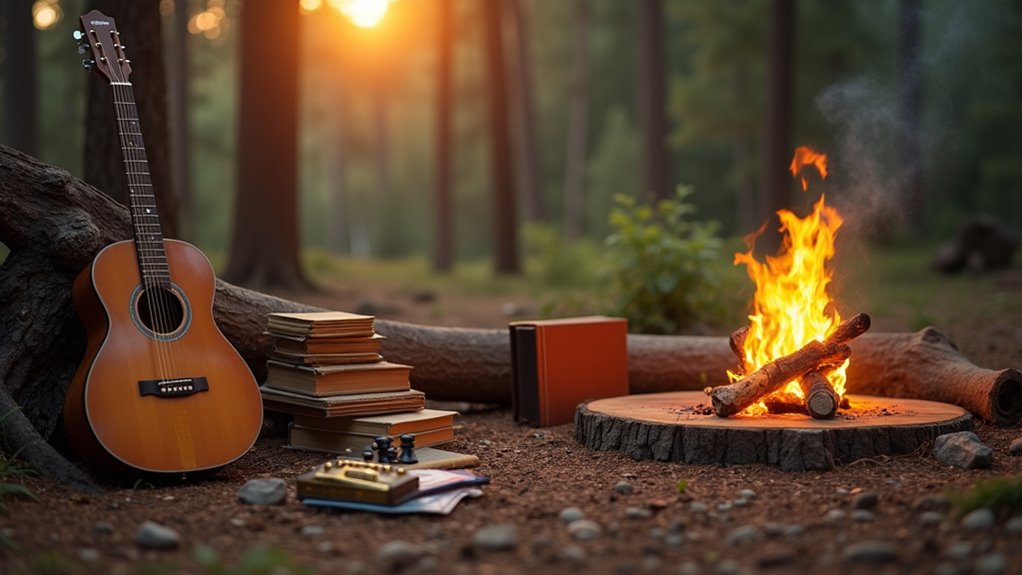Physical Address
304 North Cardinal St.
Dorchester Center, MA 02124
Physical Address
304 North Cardinal St.
Dorchester Center, MA 02124

Boost your off-grid camping game with these 8 essential tips that'll transform your powerless adventure into pure comfort.
You don’t need electrical hookups to have an amazing camping experience, but you’ll want to plan ahead to avoid frustration. Whether you’re trying to save money on campsite fees or simply prefer the authentic outdoor experience, camping without power requires some strategic preparation. The key is knowing which gear to pack and how to adapt your usual routines. These eight practical tips will help you stay comfortable, well-fed, and entertained while keeping costs down.

When you’re camping without electricity, reliable lighting becomes your lifeline after sunset. Battery-powered lanterns offer dependable illumination for your campsite. LED versions consume less power and last longer than traditional bulbs, stretching your battery life considerably. Pack rechargeable batteries and a portable charger to avoid constantly buying replacements.
Solar-powered lights provide an eco-friendly, cost-effective solution. Charge them during the day for nighttime use. Solar lanterns and string lights create ambient lighting without ongoing costs. However, they’re weather-dependent and need direct sunlight to function at their best.
Consider headlamps for hands-free lighting while cooking or setting up camp. They’re lightweight, practical, and won’t drain your lantern’s battery for basic tasks. Mix different lighting types to ensure you’re never left in complete darkness.
Don’t forget to set up a well-lit area around your camping tables where you can prepare meals and organize gear safely during evening hours.
Without a refrigerator to keep food fresh, you’ll need to stock up on non-perishable items that won’t spoil during your trip. Canned goods, dried fruits, nuts, crackers, and pasta are excellent choices that don’t require refrigeration. Pack instant oatmeal, peanut butter, and granola bars for quick energy boosts.
For cooking, bring manual equipment that doesn’t rely on electricity. A portable camping stove with fuel canisters works perfectly for boiling water and cooking meals. Don’t forget a manual can opener, sharp knife, and lightweight cookware.
A cast iron skillet doubles as both cooking surface and serving plate.
Consider foil packet meals you can cook over a campfire. Pre-mix dry ingredients at home to save space and preparation time at your campsite. Look for affordable camping gear options to keep your equipment costs low while still getting quality manual cooking tools.

While you’re planning meals that don’t need refrigeration, don’t forget about keeping your important devices charged. Portable power banks are essential for camping trips—they’ll keep your phone, flashlight, and other small electronics running when you need them most. Look for high-capacity models that can charge multiple devices several times over.
Hand-crank chargers offer a reliable backup option that doesn’t depend on pre-stored power. These manually-operated devices let you generate electricity by turning a handle, perfect for emergency situations. Many models include built-in flashlights and radios, giving you multiple functions in one compact tool.
Solar chargers are another budget-friendly option worth considering. They’re silent, lightweight, and harness free energy from the sun during daylight hours. For a more comfortable night’s rest when your electronics are safely charged, consider investing in a quality camping cot that will keep you elevated off the cold ground.
How do you keep your food fresh and safe when there’s no electricity to power a refrigerator? A quality cooler with plenty of ice becomes your best friend.
Pack raw meats at the bottom where it’s coldest, and keep drinks in a separate cooler since you’ll open it frequently. Pre-freeze water bottles – they’ll act as extra ice blocks and provide cold drinking water as they melt.
Pre-frozen water bottles serve double duty as ice blocks and drinking water while keeping your cooler organized by frequency of access.
Block ice lasts longer than cubed ice, so buy both if possible. Keep your cooler in shade and avoid opening it unnecessarily.
Pack items in reverse order, placing foods you’ll need first on top. A well-packed cooler can maintain safe temperatures for 3-4 days with proper ice management.
For winter camping without electricity, snow can serve as natural refrigeration, but proper avalanche safety gear remains essential when camping in mountainous terrain.

Once you’ve sorted out your food storage, you’ll want to think about how to spend your evenings around camp. Pack classic games like cards, dice, or travel-sized board games that don’t take up much space. Bring books, crossword puzzles, or journals for quieter moments. A guitar or harmonica adds musical entertainment without batteries.
Plan group activities like storytelling, charades, or twenty questions that cost nothing and bring everyone together. Stargazing becomes incredible without light pollution—download astronomy apps before you leave home.
Don’t forget simple crafts like friendship bracelets using paracord or whittling with a pocket knife.
Consider organizing exciting activities like scavenger hunts, nature photography contests, or campfire cooking competitions to keep everyone engaged throughout your trip.
These low-tech options often create the most memorable camping experiences while keeping your budget intact.
When electricity isn’t available to power heaters or fans, your clothing and bedding become your primary defense against the elements. You’ll need layers that adapt to changing temperatures throughout the day. Pack moisture-wicking base layers, insulating mid-layers like fleece, and a waterproof outer shell. Don’t forget extra socks and underwear.
For bedding, choose a sleeping bag rated below the expected nighttime temperature. Add a sleeping pad for insulation from the ground – even a budget foam pad works better than nothing. Pack a warm hat since you lose significant heat through your head.
Bring rain gear regardless of the forecast. Weather changes quickly outdoors, and staying dry keeps you warm and comfortable without electric backup systems. Following these essential tips will help ensure your off-grid camping adventure remains enjoyable despite unpredictable weather conditions.

Since you can’t rely on electric tools or automatic ignition systems while camping off-grid, you’ll need reliable manual alternatives that won’t fail when batteries die. Pack a sharp fixed-blade knife, folding saw, and hatchet for wood processing and camp tasks. These tools require no power and last for years with proper care.
Manual tools like fixed-blade knives, folding saws, and hatchets provide reliable backup when electric equipment fails in remote camping situations.
For fire-starting, bring multiple ignition sources: waterproof matches, a reliable lighter, and ferro rod as backup. Gather dry tinder materials like birch bark, pine needles, or cotton balls soaked in petroleum jelly before your trip.
You’ll also want fatwood or commercial fire starters for wet conditions.
Don’t forget a small sharpening stone to maintain your tools’ edges throughout your camping adventure. These preparations will help ensure your family camping experience remains enjoyable even without modern electrical conveniences.
Without access to tap water or electric pumps, you’ll need reliable methods to collect, purify, and store clean drinking water throughout your camping trip. Pack water purification tablets or drops—they’re lightweight and budget-friendly. Portable water filters work well for streams and lakes, though they cost more upfront. Boiling water over your campfire remains the most dependable purification method if you’ve got time and fuel.
Bring multiple storage containers like collapsible water jugs or large bottles. Don’t rely on just one container in case it breaks or leaks. Consider a gravity-fed water system if you’re staying put for several days.
Always carry more water than you think you’ll need, and know your water sources before arriving. Having backup purification methods ensures you won’t go thirsty. For extended camping trips lasting several days or weeks, investing in quality water filters becomes even more critical for maintaining a safe and reliable water supply.
You’ll find that camping without electricity isn’t rocket science once you’ve got the right gear and mindset. Stick to these budget-friendly basics: reliable lighting, manual tools, and proper food storage. Don’t forget your entertainment and weather gear. With a little preparation, you’ll discover that unplugging from the grid actually plugs you back into nature’s rhythm. Your wallet won’t take a beating, and you’ll gain invaluable outdoor skills that’ll serve you well on future adventures.